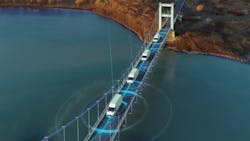New Report Says Cost of Electrifying U.S. Commercial Truck Fleet at $1 Trillion
Full electrification of the U.S. commercial truck fleet would require nearly $1 trillion in infrastructure investment alone, according to a new report from Roland Berger released in March by the Clean Freight Coalition. The study forecasts a realistic infrastructure buildout for the electrification of medium- and heavy-duty commercial vehicles, exposing what the CFC calls a massive investment gap as state and federal policymakers mandate increased adoption rates of battery-electric commercial vehicles.
Key findings:
- Preparing today's commercial vehicle fleet for electrification would require the commercial vehicle industry to invest upwards of $620 billion in charging infrastructure alone, including chargers, site infrastructure, and electric service upgrades.
- Utilities would need to invest $370 billion to upgrade their grid networks to meet the demands of just commercial vehicles.
- This nearly $1 trillion expenditure does not account for the cost of new battery-electric trucks, which according to market research can be two to three times more expensive than their diesel-powered equivalents. For example, a diesel Class 8 truck costs roughly $180,000, while a comparable battery-electric truck costs over $400,000.
The CFC, which consists of transportation stakeholders across the trucking and motorcoach industries, says that policymakers must address these cost concerns and infrastructure hurdles to make an electrified supply chain function smoothly for the American economy. The study found that while medium-duty vehicles will face fewer roadblocks, economic and operational constraints make electrification very challenging for the heavy-duty segment. Furthermore, the study outlined the significant improvements in battery range and charging infrastructure capabilities that would be needed to support a path for the electrification of longhaul vehicles.
"Electrification means focusing on the vehicle segments that are easier first; it means that we have to look at how fleets operate and potentially adjust; it means that we need better cooperation and planning across industries and governments; and it requires an openness to alternative technology paths to decarbonizing the heavy-duty segment," said Roland Berger Senior Partner Dr. Wilfried Aulbur. "It also is clear that an industry with a yearly turnover of about $800 billion and a profit margin around 5% cannot invest $620 billion without financial support or a significant increase in freight rates."
"This study thoroughly examines the issues surrounding the infrastructure buildout necessary to electrify commercial vehicles, and it clearly shows how the heavy-duty vehicle industry's needs are vastly different not just from other sectors of our economy, but from each other," said CFC Executive Director Jim Mullen. "I want to thank the team at Roland Berger for so clearly outlining the challenges electrifying our supply chain poses as the industry and nation continue working toward our shared goal of reducing trucking's impact on the environment."
To read a one-page summary of the report, click here. A fuller summary of Roland Berger's work can be found here.
